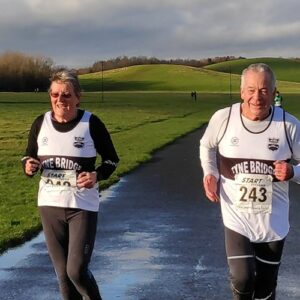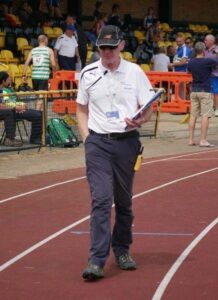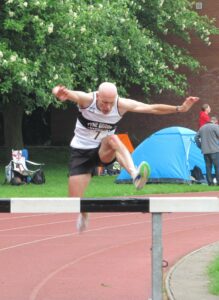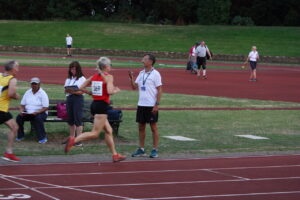We have all crossed finish lines and perhaps been too knackered to look up and see who is around us at that point, other than just the people you have been racing. We should be mindful, however, that we don’t get our Power of 10 results, prizes or even just a time, without the unsung heroes of our sport – the officials. The events can’t take place without someone starting the race and no results would be published without timekeepers. Field and track judges are there to make sure the rules are adhered to so that everything is fair and square.
Officials come from a variety of backgrounds and stand in all weathers whilst the rest of us take part in races. Find out more below about who is officiating on behalf on TBH, how they got involved and what they get out of doing it.

Jessica and Sandy Anderson (Level 2 Field and Level 1 Endurance Officials)
After joining TBH, we got drawn into turning up for the Track and Field league meetings which, back then, had quite a lot of support from the club. Not being great runners (Masters categories do not count in the League), we tried out some of the Field events, and we got drawn into helping to officiate those which were the responsibility of TBH.
We soon realised that TBH had no qualified Field Officials and that we could score more points for TBH by becoming qualified rather than (or as well as) competing – some officials compete in events they do not officiate. TBH funded our Health & Safety and Level 1 Field Officiating courses and after doing these and the requisite minimum 4 meets, we qualified.
We both progressed to Level 2 Field (passing a multiple-choice test on the Rules plus a newly introduced assessment of competence for long throws) and last year we also qualified as Level 1 Endurance Officials (which included a Risk Assessment course) so that as we both slowed down even more we could support Cross Country, trail, fell and road race events (and we’ll aim for Level 2).
We’ve met a lot of nice folk from other clubs, not just officials (a lot of whom are former competitors, or athlete parents or coaches), but also other coaches and competitors and we’ve picked up on a lot of good practice from other NE clubs (which we have tried to pass onto TBH). There is no pressure to support any event (other than NEYDL and the track and field league for your club). We choose not to progress to higher levels or support events outside the NE or abroad, but those opportunities are there if you wish.

Micky Baker
Having played sport all my life, mostly rugby and football, I used running as way to keep fit. I actually did the first GNR in 1981, but it wasn’t till my late 30’s that I took up running seriously, joining a club then to TBH.
Fast forward to my early fifties, and it was becoming apparent that my knee wasn’t going to let me run for much longer. So I was in a bit of a dilemma as to what to do athletics wise, as I didn’t want to leave the sport. I then received an email asking if anyone wanted to be a ‘starter’. I replied and went on starters course at Gateshead, it was a day’s course and covered mostly theory. The next step was an indoor meeting on a Thursday night and I was allowed to start some races.
I now work alongside people who have worked at World championships and Olympic games and those who only work locally, it depends on the individual how much they want to achieve.
The North East, in fact the whole country are always on the lookout for starters and we are a really friendly bunch. With so many meetings on we are always looking for starters, this really helps the club as I am the only Starter associated with club.
If Starting’s not for you, then maybe a role as a ‘Starters assistant’ might suit you, this person gets the athletes lined up for the Starter to start the race and again this role would really help the club at local meetings when the club needs to provide officials. This course is again a one day course and is held in conjunction with the starters course.
Being an official keeps me involved in the sport, helps me keep in touch with my many friends I’ve made over the years and to make new ones, but one of the main reasons is that I am putting something back in into the sport that I got so many good times out of it and helps the club when officials are needed for the track.

Dave Moir
Whilst organising TBH’s involvement in the North East Youth Development League (NEYDL) in 2022, it became apparent to me, that as a club, we weren’t making much of a contribution to the actual running of these events. I ended up volunteering to help with timekeeping at the first event of the season and quite enjoyed seeing things “from the other side”.
The actual timekeepers were very friendly, welcoming and encouraging, so I went back at the following fixture to help out again. One of them mentioned to me that to get an actual official Level 1 qualification, it really isn’t that onerous, and as for timekeeping, you only need 4 experiences to qualify, I decided to time-keep at the other 2 fixtures as well. I even bought my own watch just to make it all official. After a DBS check, and a short online course (at the time there were no in person sessions), a welfare course, that was it I was a qualified level 1 timekeeper.
The club bought me an NECAA Officials T-shirt and there was no stopping me after that. The following season, I then realised how short TBH were in the Senior League for officials, and as you get points for providing officials, we were often losing several team placings at each fixture due to other clubs having plenty of officials, and us having none. So, my usual role of “filler in” at the senior fixtures (basically I’ll cover some of the less popular events that we would lose out on points for as no one else is willing to do them) got extended to timekeeping as well. The other timekeepers agreed to cover my timekeeping duties if I need to go off and run, jump or throw, and I have even been known to queue jump at the discus to get back quickly to time the next race. I only needed to time-keep at a further 4 races in order to gain my level 2 qualification, and I ended up doing a few more than that. The main difference for this level was a set of questions I needed to answer, I had to attend a meeting with electronic timing in place and provide times within a certain degree of accuracy. After submitting all the relevant paperwork, I very shortly heard that I was now a qualified Level 2 timekeeper and am in real danger of being chief timekeeper in the coming season.
Why I become an official:
The T&F meets can’t go ahead without officials, but bear in mind, every race you have taken part in that submit results to Power of 10 also need qualified officials, and they can’t happen without them.
It’s not too onerous to get a qualification, and the support you receive from the very knowledgeable and encouraging existing officials is great.
There is a real feel of camaraderie within your chosen area of officiating and interactions between the other teams are usually light hearted and friendly.
You can take this qualification to what ever level you want to. If you are happy just helping out at local events, then that’s fine, but if you’d like to officiate at the Olympics, then there are NE officials who have done that.

Russell Dickinson-Deane
I decided to get involved when I realised how elderly lots of the officials were, and that in 10 years there might be no events if new people didn’t start getting involved. It also means if I’m training for a big race and want to rest my legs I can still be involved.
I’m a Level 2 Timekeeper, and a Level 1 Endurance Official. The Levels go from 1 (novice) to 4 (Olympic Standard), and you progress through at your own pace. I helped out at a few local Masters track events, a couple of indoor events at Gateshead Stadium and an inter-university challenge to progress from Level 1 to 2 timekeeper, but many people are happy to stick at the lower level and just help their club. I really enjoy the role as you get to see the action close-up, you learn new skills, and you are helping your club too. I am also still able to run as you tell the Officials Secretary when you are available, so at the Masters Track league I run 3 / officiate 3, and the same for the Harrier League. I’m happy to chat to anyone that wants to know more.
